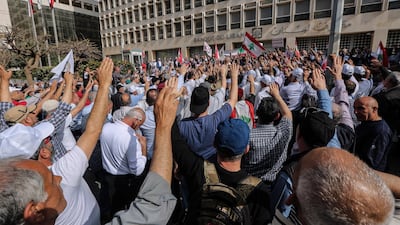The Beirut Stock Exchange suspended trading on Monday after an indefinite strike by employees of Lebanon's central bank who fear their salaries could be cut by 25 per cent.
The continuing strike at the Banque du Liban has affected the processing of transactions, Ghaleb Mahmassani, the acting head of the Beirut Stock Exchange committee, said on Monday.
"The central bank has decided to stop trading in its markets until the aforementioned reasons cease and to protect the rights of investors in the stock market," Mr Mahmassani said.
The bank's directive takes effect immediately. The exchange closed on Friday up 0.17 per cent at 904.07.
Although the statement was released after trading should have closed for the day, the website of the Beirut Stock Exchange showed no activity had taken place on Monday.
But the impact of such a closure on the economy is limited, Nassib Ghobril, chief economist at Byblos Bank, told The National.
There are only 10 companies listed on the Beirut stock exchange, which has a market capitalisation of $9 billion (Dh33bn).
By comparison, the Dubai stock exchange has 68 listed companies and a market capitalisation of $97.4bn.
The country’s 850 central bank employees have been on strike since Friday to protest against a possible cut in their wages by the government.
Abbas Awada, who leads the union behind the protests, told The National that this is the first time central bank employees had walked out.
Mr Awada said that the 2019 budget, which is being examined by the Cabinet before being sent to Parliament for vote, includes provisions that would reduce the bank's employees’ salaries by 25 per cent.
They are paid 16 months of salary a year, but this could be whittled down to 12 payments, he said.
Mr Awada said employees would decide their next step at a meeting on Tuesday morning.
“I think the decision will be positive and that we will suspend the strike”, he said.
But if the government approved the budget in its existing form, the strike could continue.
An open-ended strike could lead to a shortage of Lebanese pounds in the market as transactions in the currency move through the central bank.
The Banque du Liban governor, Riad Salameh, has called for an end to the strike.
The demonstrators say the government does not have the right to cut their wages because the regulator's budget is independent of the Finance Ministry.
But President Michel Aoun and Prime Minister Saad Hariri have reportedly assured Mr Salameh that the new budget would not affect bank employees’ benefits.
All inter-bank operations have been affected by the strike, Mr Ghobril said.
“The clearing of cheques is delayed, exchanging foreign and local currencies is on hold, but transfers in and out of Lebanon are not affected,” he said.
Founded in 1963, the bank operates independently from the government but must submit a financial report to the Finance Ministry every year.
The nomination of the governor and the four vice-governors is approved by Cabinet, and 80 per cent of its earnings go to the Finance Ministry. The rest stays with the central bank.
Facing financial disaster and hoping to tap into $11bn in international loans and grants to bolster the economy by rebuilding shattered infrastructure, the Lebanese government has drafted what officials call an “austerity budget”.
Mr Hariri has said that ministries will see deep cuts to their budgets to try to bring spending under control.
Lebanon is the third most indebted country in the world after the US and Japan, with a GDP to debt ratio of 140 per cent in 2018.
Foreign Minister Gebran Bassil tweeted in April that public sector salaries should be cut to reduce the country's ballooning $85bn debt "or there will be no salaries left for anyone".
The tweet prompted waves of strikes and demonstrations over the past few weeks across the country.
Employees of the National Social Security Fund were also on strike on Monday, the state-run National News Agency reported.
After years of stagnation and social inequality, many Lebanese struggle to make ends meet. The UN says nearly a third live on less than $270 a month.
The civil war in neighbouring Syria hit the Lebanese economy hard. Fighting cut the country off from overland routes to its major Middle East trade partners, with farmers particularly hard hit as they were unable to export their produce to Gulf markets.
From nearly 10 per cent growth a year before the start of the Syria war in 2011, Lebanon’s growth fell sharply to a little over 1 per cent the year after, where it has remained since.
The country also took on the burden of hosting more than a million more refugees fleeing the Syrian violence.
While it has received billions of dollars in international assistance in the past eight years, long-term structural issues have plagued the country since the end of the 15-year civil war in 1990.
Lebanon is unable to produce continuous electricity and power cuts last between 3 and 12 hours on a normal day but are often longer.
The state power company, Electricite du Liban, runs a deficit of more than $1bn a year – abouty 3.8 per cent of GDP – which the government is left to pick up.
While many of Lebanon's ministries and official institutions suffer from nepotism and sectarianism, analysts say the central bank is one of its most efficiently run government bodies.
They say that when power sharing was agreed to end the war in 1990, a decision was made to keep the central bank out of party and sectarian politics to ensure stability.
Mr Salameh, who has been in the post since 1993, has been credited with steering the country's finances and isolating Lebanon from the global financial crash in 2007.

